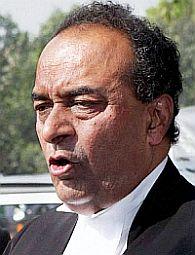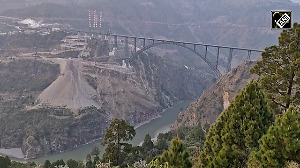 "Justice has prevailed for the families of those who lost their lives in the 1993 Mumbai blasts," Attorney General Mukul Rohatgi said on Thursday on the Supreme Court ruling that came shortly before Yakub Memon was hanged.
"Justice has prevailed for the families of those who lost their lives in the 1993 Mumbai blasts," Attorney General Mukul Rohatgi said on Thursday on the Supreme Court ruling that came shortly before Yakub Memon was hanged.
"I am happy that the long process has come to an end. The convict was given opportunity for 22 years. Memon's review petition and mercy petitions were dismissed. He also got the right to have second review plea heard in an open court," Rohatgi told PTI.
Explaining the opportunities given to Memon and all the legal remedies exhausted by him, Rohatgi said, "A curative petition was filed and was dismissed on July 21, this year.
A new writ petition was heard from July 27 until Wednesday. Even the Maharashtra governor and the President rejected his clemency pleas again. Then fresh petitions were moved at midnight in the Supreme Court and that ultimately culminated into this."
Hailing the apex court for its unprecedented hearing, Rohatgi said, "I am happy that the Supreme Court rose to the occasion. It heard the plea of a condemned prisoner like Memon who was involved in the killing of 257 persons. It is now a role model for all courts in India and a beacon for justice.
"Esteem of the apex court has risen tremendously. In an unprecedented hearing, it heard a case at 3 am because the hanging was due for 7 am, notwithstanding the fact that the bench had heard the plea of the convict from 10.30 am to 4.30 pm on Wednesday after giving hearing to both sides," he said.
Expressing similar views, former Attorney General Soli Sorabjee said, "I am very proud that we have a judiciary which is very sensitive to the rights of the people."
Reacting to the concern that all convicts facing death penalty cases could now demand an all night hearing just hours before execution, both the former and the present Attorney Generals termed it a case which required such a move by the apex court and said all cases are different.
"Unprecedented hearings have occurred in the past also. The SC does not make descriminations, it has upheld the majesty of law. This last minute hearing was agreed to by the SC because of the convict's latest mercy petitions which were moved on Wednesday," Rohatgi said, adding "It is unfortunate that there was no other way in this case."
"It was a special case," Sorabjee said, adding that it won't lead to a practice of approaching the apex court at midnights in all cases.
Rohatgi, who had opposed Memon's plea in the apex court in an early morning hearing today, stressed on the need to expedite death penalty cases but said that capital punishment cannot be done away with due to prevalent terror strikes.
"I think in the present scenario, with terror attacks every second day, it is not appropriate to do away with death penalty. Death penalty is valid under Indian law and if you look at the number of executions in the last 10 years, you can literally count them on your fingers," he said.
Contesting opposition to capital punishment from activists and politicians on the ground that they are barbaric and should be done away with, he said, "People can have their own opinions. The debate on capital punishment cannot be held in the court. The courts have upheld it, end of the matter."
Sorabjee differed with his opinion and supported the idea of abolishing death sentence.
"I personally believe in abolition of death penalty but not in this case looking at the nature of the crime and also because Memon got enough chance to defend himself," he said.
Rohatgi, however, advocated that "deterrent effect of death penalties" has diluted due to the time taken in deciding such cases.
"Deterrence effect that death penalty is supposed to have has been diluted in the country for a simple reason that by the time death penalty is awarded, it is usually 15-20 years and it takes several years by the time death penalty is actually executed. We must speed up the process in death cases," he said.
Later, talking to a TV channel, the Attorney General rubbished the contention that "unholy haste" was shown by the President in rejecting Memon's clemency plea and seven hours were not enough for him to decide the issue.
"If President decides prominently, you accuse him of unholy haste and if he takes time you say there has been a long delay in deciding the mercy plea," he said.
"Nothing would have happened if the death was delayed by 10 more days but you have to stick to some timelines. Justice has also to be done to the other side. Don't forget that this gentleman (Memon) was convicted for killing 257 people.
"In this particular case, Supreme Court has twice ruled in last 24 hours that this is not the legal position. There must be quietus put to after two judgments of the apex court," he said.
The AG said that the question here is at what point the 14-day period starts. "It starts when you decide or when you had send the representation in April 2014. What was stopping Memon from challenging the decision of the President? He could have said at that point only that President of India has not applied his mind.
"He had exhausted all his legal forums. Midways, he also moved the executive forum. You have to have a finality otherwise it could have gone for another 5-10 years," he said.
On the issue of two "new" grounds in the case, the AG said the issue of schizophrenia was raised in 2013 itself.
"On what basis you are assuming that President and the Home Ministry which aided and advised him did not look at these features. President is not the appellate authority. He does not read 300 pages of judgment. He had already rejected it once and when it was put to him again he discussed it with the Home Ministry and reached a conclusion."
On late RAW official B Raman's article, he said, "I only talked about schizophrenia. Nobody knew of B Raman's article".
"It is not a piece of evidence. It cannot be taken into account unless it is part of evidence. It has to be proved. What is the veracity of an article circulating after 25 years? It cannot be ground for a mercy decision.
"There is no reason to accuse the President. President had called me because the judgment was not uploaded on the Internet and know about the judgment passed in the apex court.
"Don't expect the President to become an appellate judge. His jurisdiction is entirely different. There is no reason to accuse him that the seven hours time taken by the first citizen of the country to decide the clemency plea was not enough," he said.
Commending on the role of the Supreme Court in the matter, he said, "The apex court has been extremely indulgent. It rose to the occasion when last ditch effort was made.
"Everybody must salute the apex court in the manner it gave free access to justice and heard the matter with great patience. It is rarest of the rare case. This case is an example where complete access to justice has been given," he said.






 © 2025
© 2025